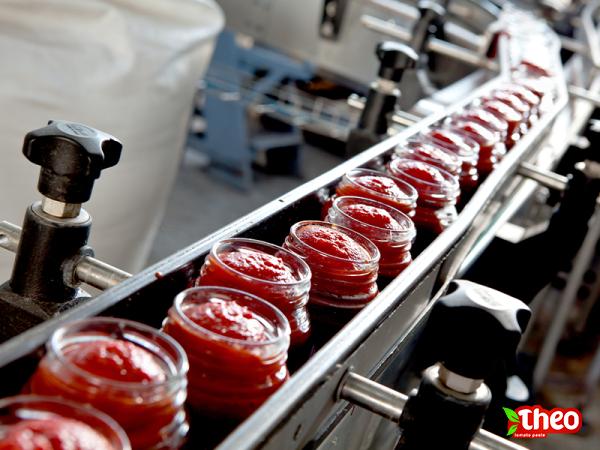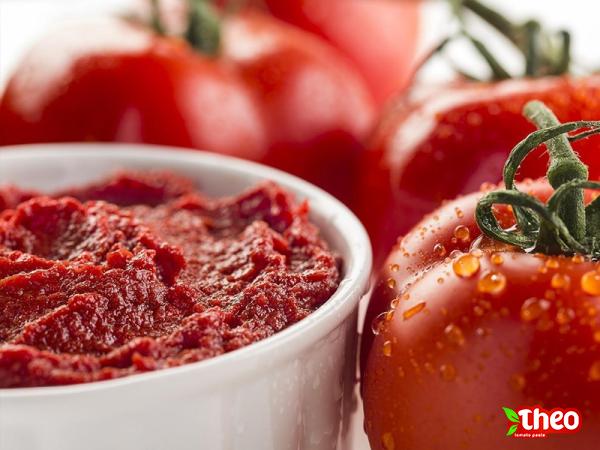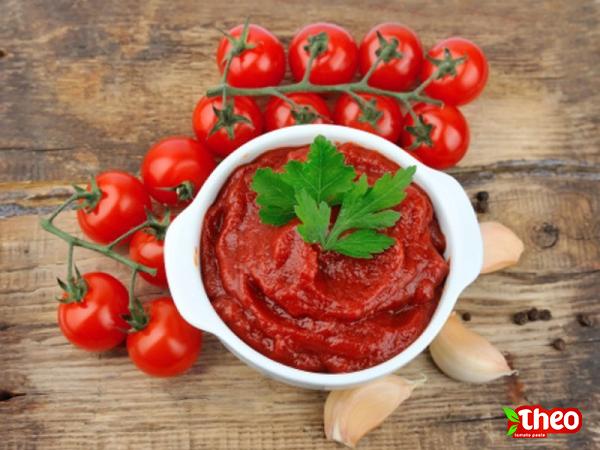Tomato paste is a thickener made from tomatoes that have been cooked down and reduced to a concentrated form. It is commonly used in a variety of dishes and cuisines to enhance flavor, add richness, and provide a thicker consistency to sauces, soups, stews, and other recipes. The process of making tomato paste begins with ripe tomatoes that are harvested and then processed to remove the skin and seeds. The remaining flesh is then cooked down and strained multiple times to eliminate excess water and create a thick and smooth consistency. One of the main reasons tomato paste is used as a thickener is because of its high concentration of natural pectin. Pectin is a type of natural fiber and polysaccharide found in the cell walls of fruits and vegetables, including tomatoes. When tomatoes are cooked down and concentrated into paste form, the pectin naturally thickens the mixture. The thickening property of tomato paste can be attributed to both the natural sugars and the pectin content. The sugars present in tomatoes, mainly fructose and glucose, help to create a gel-like structure when combined with pectin. This gel-like structure contributes to the thickening of sauces and other dishes. In addition to its thickening properties, tomato paste also provides a rich and intense flavor to recipes. The cooking process concentrates the natural sugars in tomatoes, resulting in a slightly sweet and savory taste. This concentrated flavor profile allows for a deeper and more robust taste in dishes. Tomato paste is often used as a base for various sauces, such as marinara sauce, ketchup, and barbecue sauce. It serves as a flavor-enhancing ingredient and helps to create a well-balanced and complex taste. Its thickening properties allow the sauces to cling to pasta, meat, or other ingredients, ensuring a satisfying and flavorful eating experience. Besides its use in sauces, tomato paste can also be used as a thickener in soups and stews. It adds body and richness to these dishes, making them heartier and more satisfying. The thickening effect of tomato paste can help create a velvety texture in creamy soups or a thicker consistency in chunkier stews.

tomato paste
 Furthermore, tomato paste can be used as a thickener in vegetarian or vegan recipes as a substitute for animal-based products like cream or butter. It adds depth and thickness to plant-based dishes, making them more indulgent and flavorful. When using tomato paste as a thickener, it is important to consider the quantity and timing of its addition. Since tomato paste is very concentrated, a small amount can go a long way in terms of adding flavor and thickening power. It is often recommended to start with a small amount and gradually add more if needed. It is also important to incorporate the tomato paste early in the cooking process to allow its flavors to meld with the other ingredients. In conclusion, tomato paste is a versatile ingredient that serves as a thickener in various recipes. Its natural pectin and sugar content contribute to its thickening properties and allow for the creation of rich and flavorful dishes. From sauces to soups, tomato paste adds body, depth, and a delicious taste to a wide range of culinary creations.I. The Market for Tomato Paste as a Thickener Tomato paste holds a significant position in the food industry as a thickening agent. Its popularity can be attributed to the wide range of applications it offers, including sauces, soups, stews, and various other recipes. The market for tomato paste as a thickener is driven by the growing demand for convenience foods, the worldwide popularity of international cuisines, and the desire for bold flavors in cooking. The global market for tomato paste is expected to witness steady growth in the coming years. According to a report by Grand View Research, Inc., the market was valued at $2.06 billion in 2020 and is projected to reach $3.02 billion by 2028, with a compound annual growth rate (CAGR) of 4.7%. The increasing demand for processed foods and the rising adoption of tomato-based products in emerging economies are among the key factors contributing to this growth. II. Applications of Tomato Paste as a Thickener Tomato paste is a versatile ingredient that finds application in various industries, including the culinary, foodservice, and food manufacturing sectors. Below are some of the key applications of tomato paste as a thickener: 1. Sauces: Tomato paste serves as a fundamental ingredient for creating flavorful and thick sauces like marinara, pizza sauce, and pasta sauce. Its thickening properties help to enhance the texture and consistency of these sauces, allowing them to cling to pasta, bread, or other ingredients.
Furthermore, tomato paste can be used as a thickener in vegetarian or vegan recipes as a substitute for animal-based products like cream or butter. It adds depth and thickness to plant-based dishes, making them more indulgent and flavorful. When using tomato paste as a thickener, it is important to consider the quantity and timing of its addition. Since tomato paste is very concentrated, a small amount can go a long way in terms of adding flavor and thickening power. It is often recommended to start with a small amount and gradually add more if needed. It is also important to incorporate the tomato paste early in the cooking process to allow its flavors to meld with the other ingredients. In conclusion, tomato paste is a versatile ingredient that serves as a thickener in various recipes. Its natural pectin and sugar content contribute to its thickening properties and allow for the creation of rich and flavorful dishes. From sauces to soups, tomato paste adds body, depth, and a delicious taste to a wide range of culinary creations.I. The Market for Tomato Paste as a Thickener Tomato paste holds a significant position in the food industry as a thickening agent. Its popularity can be attributed to the wide range of applications it offers, including sauces, soups, stews, and various other recipes. The market for tomato paste as a thickener is driven by the growing demand for convenience foods, the worldwide popularity of international cuisines, and the desire for bold flavors in cooking. The global market for tomato paste is expected to witness steady growth in the coming years. According to a report by Grand View Research, Inc., the market was valued at $2.06 billion in 2020 and is projected to reach $3.02 billion by 2028, with a compound annual growth rate (CAGR) of 4.7%. The increasing demand for processed foods and the rising adoption of tomato-based products in emerging economies are among the key factors contributing to this growth. II. Applications of Tomato Paste as a Thickener Tomato paste is a versatile ingredient that finds application in various industries, including the culinary, foodservice, and food manufacturing sectors. Below are some of the key applications of tomato paste as a thickener: 1. Sauces: Tomato paste serves as a fundamental ingredient for creating flavorful and thick sauces like marinara, pizza sauce, and pasta sauce. Its thickening properties help to enhance the texture and consistency of these sauces, allowing them to cling to pasta, bread, or other ingredients.
Specifications of tomato paste
 2. Soups and Stews: Tomato paste is frequently used in soups and stews to thicken the broth and provide a rich, hearty flavor. It adds depth and body to the dishes, transforming them into wholesome and satisfying meals. 3. Dips and Spreads: Tomato paste can be incorporated into dips and spreads to improve their texture and taste. It makes for a delicious base ingredient in recipes like tomato salsa, bruschetta, or even as a topping for sandwiches or wraps. 4. Meat and Poultry Products: Tomato paste is commonly used as a thickener in meat and poultry products, such as meatballs, meatloaf, or gravies. It helps to bind the ingredients together and contributes to the savory flavor profile of the dishes. 5. Ready-to-eat Meals: The convenience food industry heavily relies on tomato paste as a thickener to add flavor and thickness to ready-to-eat meals. It allows for the production of shelf-stable products with a long shelf life, while still maintaining the desired taste and texture. III. Benefits of Using Tomato Paste as a Thickener Tomato paste offers several benefits as a thickening agent in culinary preparations. Here are some key advantages: 1. Intense Flavor: Tomato paste boasts a concentrated and robust flavor profile, making it an excellent choice for enhancing the taste of dishes. Its natural sugars and savory undertones add complexity and depth to the overall flavor. 2. Nutritional Value: Tomato paste is a rich source of vitamins A and C, antioxidants, and dietary fiber. Its use as a thickener allows for the retention of these beneficial nutrients in recipes, providing added nutritional value to meals. 3. Natural and Clean Ingredient: Tomato paste is typically made from pure tomatoes without the addition of preservatives, colorants, or artificial flavorings. This makes it a preferred choice for consumers seeking natural and clean-label ingredients. 4. Cost-Effective: Compared to other thickeners or flavor enhancers available in the market, tomato paste is relatively cost-effective. A small amount can go a long way, making it an economical choice for both home cooks and food manufacturers. 5. Versatility: Tomato paste can be easily incorporated into a wide range of recipes, giving them a unique twist and enhancing their overall texture. Its versatility allows for creative culinary experimentation. IV. Factors Driving the Demand for Tomato Paste as a Thickener
2. Soups and Stews: Tomato paste is frequently used in soups and stews to thicken the broth and provide a rich, hearty flavor. It adds depth and body to the dishes, transforming them into wholesome and satisfying meals. 3. Dips and Spreads: Tomato paste can be incorporated into dips and spreads to improve their texture and taste. It makes for a delicious base ingredient in recipes like tomato salsa, bruschetta, or even as a topping for sandwiches or wraps. 4. Meat and Poultry Products: Tomato paste is commonly used as a thickener in meat and poultry products, such as meatballs, meatloaf, or gravies. It helps to bind the ingredients together and contributes to the savory flavor profile of the dishes. 5. Ready-to-eat Meals: The convenience food industry heavily relies on tomato paste as a thickener to add flavor and thickness to ready-to-eat meals. It allows for the production of shelf-stable products with a long shelf life, while still maintaining the desired taste and texture. III. Benefits of Using Tomato Paste as a Thickener Tomato paste offers several benefits as a thickening agent in culinary preparations. Here are some key advantages: 1. Intense Flavor: Tomato paste boasts a concentrated and robust flavor profile, making it an excellent choice for enhancing the taste of dishes. Its natural sugars and savory undertones add complexity and depth to the overall flavor. 2. Nutritional Value: Tomato paste is a rich source of vitamins A and C, antioxidants, and dietary fiber. Its use as a thickener allows for the retention of these beneficial nutrients in recipes, providing added nutritional value to meals. 3. Natural and Clean Ingredient: Tomato paste is typically made from pure tomatoes without the addition of preservatives, colorants, or artificial flavorings. This makes it a preferred choice for consumers seeking natural and clean-label ingredients. 4. Cost-Effective: Compared to other thickeners or flavor enhancers available in the market, tomato paste is relatively cost-effective. A small amount can go a long way, making it an economical choice for both home cooks and food manufacturers. 5. Versatility: Tomato paste can be easily incorporated into a wide range of recipes, giving them a unique twist and enhancing their overall texture. Its versatility allows for creative culinary experimentation. IV. Factors Driving the Demand for Tomato Paste as a Thickener
buy tomato paste
 The increasing popularity of tomato paste as a thickener is influenced by several factors. Let’s explore some of the key drivers of demand: 1. Changing Consumer Preferences: Consumers today are seeking bold and authentic flavors in their food. Tomato paste delivers intense taste, making it a sought-after ingredient for those who appreciate rich and robust flavors. 2. Convenience and Time-saving: Tomato paste offers convenience and time-saving benefits. Its concentrated form eliminates the need for lengthy cooking times to achieve the desired thickness. This is particularly valuable in fast-paced lifestyles where convenience is paramount. 3. Growing Demand for Ethnic Cuisine: The global culinary landscape has witnessed a surge in the popularity of international cuisines, including Italian, Mexican, and Mediterranean. Tomato paste is a crucial ingredient in many of these cuisines, driving the demand for it as a thickener. 4. Health Consciousness: With the increasing focus on health and wellness, consumers are gravitating towards natural and wholesome food options. Tomato paste, with its minimal processing and nutrient-rich properties, aligns well with this trend, boosting its demand. 5. Rising Food Manufacturing Industry: The food manufacturing sector is experiencing significant growth, driven by the increasing demand for processed and convenience foods. Tomato paste serves as a valuable thickening agent for manufacturers in the production of a wide range of packaged food products. V. Challenges and Future Trends in the Tomato Paste Market While the market for tomato paste as a thickener continues to expand, there are challenges and future trends to consider. 1. Quality and Sourcing: The quality of tomato paste can significantly impact the taste and texture of the final product. Ensuring consistent quality and sourcing reliable suppliers is crucial for manufacturers and consumers alike. 2. Sustainability and Environmental Concerns: The tomato industry, like many agricultural sectors, faces sustainability challenges such as water usage, pesticide use, and waste management. Sustainable practices in tomato farming and processing will be increasingly important to address environmental concerns. 3. Development of Innovative Products: To further capitalize on the market potential, manufacturers can focus on developing innovative products that cater to changing consumer preferences. This could include organic and healthier versions of tomato paste or novel combinations with other ingredients to create unique flavor profiles. 4. Expansion of Distribution Channels: Expanding the availability of tomato paste through online platforms and international distribution channels can tap into emerging markets and reach a broader consumer base. 5. Technological Advancements: Continued research and development in processing techniques and packaging technologies could lead to increased efficiency, extended shelf life, and improved quality of tomato paste products. Despite these challenges, the market for tomato paste as a thickener is expected to remain strong due to the versatile applications, consumer demand for intense flavors, and the convenience it offers to both home cooks and food manufacturers. As the culinary landscape continues to evolve, tomato paste will continue to play a vital role in enhancing the taste, texture, and overall enjoyment of a wide range of recipes.
The increasing popularity of tomato paste as a thickener is influenced by several factors. Let’s explore some of the key drivers of demand: 1. Changing Consumer Preferences: Consumers today are seeking bold and authentic flavors in their food. Tomato paste delivers intense taste, making it a sought-after ingredient for those who appreciate rich and robust flavors. 2. Convenience and Time-saving: Tomato paste offers convenience and time-saving benefits. Its concentrated form eliminates the need for lengthy cooking times to achieve the desired thickness. This is particularly valuable in fast-paced lifestyles where convenience is paramount. 3. Growing Demand for Ethnic Cuisine: The global culinary landscape has witnessed a surge in the popularity of international cuisines, including Italian, Mexican, and Mediterranean. Tomato paste is a crucial ingredient in many of these cuisines, driving the demand for it as a thickener. 4. Health Consciousness: With the increasing focus on health and wellness, consumers are gravitating towards natural and wholesome food options. Tomato paste, with its minimal processing and nutrient-rich properties, aligns well with this trend, boosting its demand. 5. Rising Food Manufacturing Industry: The food manufacturing sector is experiencing significant growth, driven by the increasing demand for processed and convenience foods. Tomato paste serves as a valuable thickening agent for manufacturers in the production of a wide range of packaged food products. V. Challenges and Future Trends in the Tomato Paste Market While the market for tomato paste as a thickener continues to expand, there are challenges and future trends to consider. 1. Quality and Sourcing: The quality of tomato paste can significantly impact the taste and texture of the final product. Ensuring consistent quality and sourcing reliable suppliers is crucial for manufacturers and consumers alike. 2. Sustainability and Environmental Concerns: The tomato industry, like many agricultural sectors, faces sustainability challenges such as water usage, pesticide use, and waste management. Sustainable practices in tomato farming and processing will be increasingly important to address environmental concerns. 3. Development of Innovative Products: To further capitalize on the market potential, manufacturers can focus on developing innovative products that cater to changing consumer preferences. This could include organic and healthier versions of tomato paste or novel combinations with other ingredients to create unique flavor profiles. 4. Expansion of Distribution Channels: Expanding the availability of tomato paste through online platforms and international distribution channels can tap into emerging markets and reach a broader consumer base. 5. Technological Advancements: Continued research and development in processing techniques and packaging technologies could lead to increased efficiency, extended shelf life, and improved quality of tomato paste products. Despite these challenges, the market for tomato paste as a thickener is expected to remain strong due to the versatile applications, consumer demand for intense flavors, and the convenience it offers to both home cooks and food manufacturers. As the culinary landscape continues to evolve, tomato paste will continue to play a vital role in enhancing the taste, texture, and overall enjoyment of a wide range of recipes.




